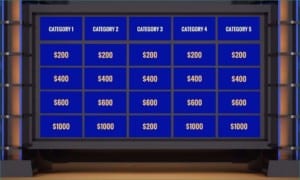
As an executive recruiter for the past twenty years, I have had many discussions with clients and candidates about my role as their recruiter. The crux of those conversations is about their experiences with other recruiters. Especially any time a recruiter has failed to meet their expectations.
What should you expect from a recruiter? Whether you are the client or the candidate, there are basic things you should expect from a recruiter. Just as we all know what to expect from our favorite TV game shows, you should expect consistent help from your recruiter. Figuring out the puzzle, finding the right mix of skills and experience, and pricing it right are what your recruiter should help you do.
Here are three thoughts on what to expect from a recruiter, based on our most popular game shows.
1. Wheel of Fortune
As a company, identifying the right candidates to add to your team is like playing Wheel of Fortune. You know the puzzle category (what the job is called.) You know how many letters and how many words are in the puzzle (the position description.) You don’t know the exact letters that will make the correct puzzle, or how they will be properly arranged. Some letters bring tremendous value (big money on the wheel), while others cost you to acquire (you must pay for vowels).
A recruiter should help companies identify which candidates to focus on to best complete their puzzle, and how to compete to get the right candidates. If you are looking for a ‘T’ or an ‘S’, a recruiter knows they commonly available and usually not difficult to find. A ‘Z’ doesn’t belong in every puzzle, but occasionally, it’s the perfect missing letter. Some recruiters are great at filling the commonly available jobs. Other recruiters are at their best finding more specialized talent. A recruiter should also advise the client about how to compete for the candidates’ attention. I can find you a ‘Q’, but unless you have a ‘U’ available, it’s going to be hard to attract the ‘Q’.
As a candidate, a recruiter can help you understand how the market views and values you. Are you an ‘R’ or an ‘L’, generally available and useful in many situations? Are you a vowel they must pay a premium for? Are you a less-frequently sought letter, like an ‘X’ or a ‘V’? A recruiter can also help you understand why you don’t fit particular roles or companies.
The recruiter helps the company describe the puzzle and recognize the missing pieces. Then the recruiter searches for the pieces to complete the puzzle, identifying candidates who might be a good fit.
2. Jeopardy!
Jeopardy! is a game that tests contestants’ knowledge. Given the answer, can you figure out the right question? What do you know? How quickly can you problem solve? How do you respond under pressure?
Recruiters help companies and candidates answer these questions. Some Jeopardy! contestants have a broad base of general knowledge. Others can run through categories quickly and show deep knowledge of particular subjects. Some can answer every science question and miss all of the history ones. Some know the questions to the easier answers, but not to the most difficult ones.
Jeopardy! players, like candidates and companies, have different playing styles. Some contestants go for broke and bet large amounts on Daily Doubles and Final Jeopardy!. Others show a much more conservative approach. Recruiters help companies and candidates articulate their personalities and playing styles, see where there will be a good fit, and avoid poor matches. Companies looking to enter new markets need talented people to help them. Some companies are risk takers and even if they fail and lose, they want to pursue a big goal. Other companies are risk adverse, and need talented people with personalities that fit their approach.
Recruiters can help candidates distinguish what they are capable of doing from what they really want to be doing. Recruiters help candidates position themselves correctly by identifying the problems they want to help solve, the deliverables they want to commit to, and their tolerance for risk.
Recruiters should help their clients identify what candidates must know, reasonably test candidates’ basic knowledge and aptitude, understand what candidates are interested in doing, and point out potential matches.
3. The Price Is Right
Contestants on The Price Is Right must guess the prices of products without going over. Companies and candidates are trying to figure out what a job is worth, also without going over the right price. How much should you bid on that showcase at the end of the show? That depends. If the car included in the showcase is a compact car, you’ll bid a bit less than if it is an SUV.
Recruiters help companies and candidates figure out the right price. A car is a car, but what you expect from it and what you expect to pay for it varies. Recruiters can help companies figure out competitive compensation for talented people. Recruiters can also help candidates express their value and set competitive compensation goals for their skills.
On The Price Is Right, you won’t usually win the prize if you bid too low. You also won’t win if you bid too much. Clients and candidates need to figure out the right price for what they value. Your recruiter should help you tailor the correct bid for the prize you want to win.
The right recruiter helps companies describe and search for missing puzzle pieces. The recruiter helps identify who has the right mix of knowledge and skills, and whose personality will be a likely fit. Finally, the recruiter helps both parties arrive at the right price.
Your recruiter should help you play to win, no matter the game.
Cheryl Bedard represents the best interests of candidates and clients. She identifies opportunities for success for talented executives and companies and reconciles hopes and dreams with reality.

